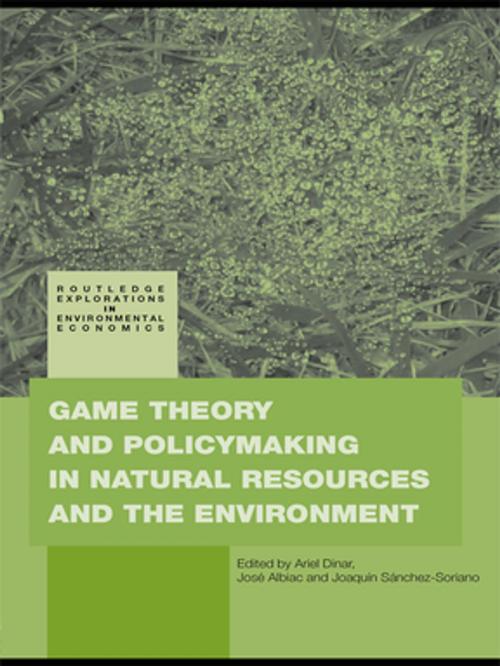Game Theory and Policy Making in Natural Resources and the Environment
Business & Finance, Economics| Author: | ISBN: | 9781135976095 | |
| Publisher: | Taylor and Francis | Publication: | January 31, 2008 |
| Imprint: | Routledge | Language: | English |
| Author: | |
| ISBN: | 9781135976095 |
| Publisher: | Taylor and Francis |
| Publication: | January 31, 2008 |
| Imprint: | Routledge |
| Language: | English |
Game Theory has become one of the main analytical tools for addressing strategic issues in the field of economics and is increasing its influence in other fields of social sciences. With the increased level of extraction of natural resources and pollution of environments, game theory gains its place in the literature and it is more and more seen as a tool for policy makers and not only for theoreticians.
The book is structured into four parts dealing with the management of natural resources, the negotiation aspects of water management, water allocation through pricing and markets, and how conflicts and regulation shape the management of the environment. The first part explores game theory concepts applied to fisheries and grazing lands, which are two important natural resources. In the next two parts, several game theory methodologies are considered in the negotiation approach to water management and approaches to water pricing and markets. The last section looks at environmental protection as the end process of the interplay between conflict and regulation.
This book includes chapters by experts from developing and developed countries that apply game theory to actual issues in natural resources and the environment. As such the book is extremely useful for graduate students and technical experts interested in the sustainable management of natural resource and the environment. It is also relevant to all Game Theory and Environmental Economics students.
Game Theory has become one of the main analytical tools for addressing strategic issues in the field of economics and is increasing its influence in other fields of social sciences. With the increased level of extraction of natural resources and pollution of environments, game theory gains its place in the literature and it is more and more seen as a tool for policy makers and not only for theoreticians.
The book is structured into four parts dealing with the management of natural resources, the negotiation aspects of water management, water allocation through pricing and markets, and how conflicts and regulation shape the management of the environment. The first part explores game theory concepts applied to fisheries and grazing lands, which are two important natural resources. In the next two parts, several game theory methodologies are considered in the negotiation approach to water management and approaches to water pricing and markets. The last section looks at environmental protection as the end process of the interplay between conflict and regulation.
This book includes chapters by experts from developing and developed countries that apply game theory to actual issues in natural resources and the environment. As such the book is extremely useful for graduate students and technical experts interested in the sustainable management of natural resource and the environment. It is also relevant to all Game Theory and Environmental Economics students.















